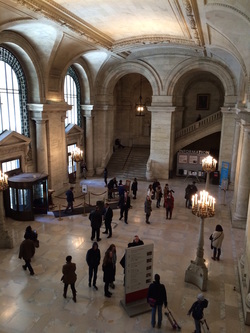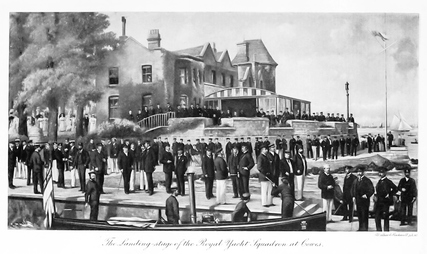 The entrance foyer at the New York Public Library.
The entrance foyer at the New York Public Library. I walked into room 217 to wait in line with the others to fulfill my order. The young lady working the counter appeared casually dressed given the ostentatious nature of the room she worked in. Strategically placed narrow brass stairs led to the upper catwalks where books were once stored. Indeed, the walls around Room 217 were lined floor to ceiling with brass shelving fixtures, empty, and abandoned. I tried to imagine the previous clientele, scanning the shelves for books needed to construct dissertations; books only found in Room 217. It is was that kind of place: these hallowed shelves hosted ghosts.
When I got to the counter I told the librarian my name, handed her my card and waited while she unceremoniously checked my request in the computer system and without a word or smile, left me while she walked through a door to retrieve my books. Maybe I was expecting too much but wasn’t she just as excited as I was to have her hands on these treasures that only the NYPL and maybe one other library in the whole nation holds in its collection?
My excitement grew when she placed the box, tied with a shoe string in my hand: the first edition of the Memorials of the Royal Yacht Squadron. Inside was a first hand account of the founding of the squadron and the social life of 19th century yacht enthusiasts who flocked to the Isle of Wight in the UK.
In the past few years of conducting research for my novel I have handled a lot of old documents: letters written in cursive in the 1860s; court documents that were so brittle I was afraid they would crack and crumble in my hands; and small leather-bound diaries that have outlasted the mold and mildew of an Adirondack winter. But this book was different.
It was tied up in a preservation box and when I untied the string and opened it I found a note prominently displayed telling me to BE CAREFUL, the book was fragile. I delicately propped the book in a V and pulled out my digital camera to take pictures of the pages I thought would be most useful. And I found more than I had time to capture with my camera: a descriptive narrative only a sailor could write on the 1851 win of the yacht America, which led to the famous America’s Cup race; photos of Commodore King Edward VII; sketches of people promenading at the landing site for the yachts; and pithy quips such as this one about prevalence of blackballing in the 1890s:
“It is precisely this black balling that makes the club to be so highly considered as it is, for in England the test of superiority is not looked for in actual worth of the thing, but in the number of people who can be prevented from enjoying it.”
 The landing of the Royal Yacht Squadron Cowes 1870s
The landing of the Royal Yacht Squadron Cowes 1870s Then I came to end of the book and the section I had been looking for - a list of the yachts. Wouldn’t you know the one yacht I was looking for was inside the one page in the whole book that had not been split open! Nineteenth century books had pages folded as folios and people opened (some say cut) the pages as they read. Just my luck the page was hidden, uncut, and I wasn’t going to be the one to do slit it open.
Feeling and probably looking like an idiot, I placed my head sideways on the massive table and pushed the fold of the page lightly with my finger to squeeze it open enough so I could peer into the interior at the printed list of yachts. What a pain. The young man sitting next to me stopped typing in his laptop and gave me a sidewise glance. I ignored him.
Then I started to panic. I had to meet someone in less than an hour and I had spent so much time with this old book that I hadn’t even gotten to the Egyptian Diaries. Reluctantly I put the book in its preservation box thinking maybe I would come back one day and read it properly. I turned my attention to the rest of my research.
I got home and downloaded the pictures and was mortified to find they were all fuzzy. When I turned off the flash I must have messed with the other settings, including the little one that shows a hand waving, which means: turn on to reduce blurriness from shaky hands. Dammit!
I live hours away from the New York Public Library and knew it would be weeks before I got back to New York City. My only consolation was that I took great notes. While I despondently deleted the pictures from my camera, only salvaging a few, I thought I better look up the book again so I could find the publisher’s name. Instead of going to the NYPL catalog I just typed the book title into a Google search and up came a link - the book, digitized on Project Gutenberg.
Yes, every page of that wonderful book, preserved for anyone to read at their leisure, online, available for downloading as a pdf. And none of the pages were blurry.
The ghosts of Room 217 were laughing at me.
 RSS Feed
RSS Feed
